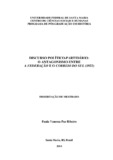| dc.creator | Ribeiro, Paula Vanessa Paz | |
| dc.date.accessioned | 2014-09-23 | |
| dc.date.available | 2014-09-23 | |
| dc.date.issued | 2014-01-17 | |
| dc.identifier.citation | RIBEIRO, Paula Vanessa Paz. PARTISAN POLITICAL DISCOURSE: THE ANTAGONISM BETWEEN
A FEDERAÇÃO AND CORREIO DO SUL (1922). 2014. 226 f. Dissertação (Mestrado em História) - Universidade Federal de Santa Maria, Santa Maria, 2014. | por |
| dc.identifier.uri | http://repositorio.ufsm.br/handle/1/9653 | |
| dc.description.abstract | This work is linked to the historiographical perspective of intellectual history. Based
on that, it aims to analyze and to compare the content and form of the rhetoric of the partisan
political discourse of the newspapers A Federação and Correio do Sul in the electoral process
of Rio Grande do Sul in 1922. The analysis and the interpretation of partisan political
discourse of the newspapers was carried out through the theoretical and methodological
contributions of Pocock (2003), in the study of political discourse performance and the
relationship between context and action; the operation modes of meaning and action of
ideological symbolic strategies written by John Thompson (2009) and, particularly, the theory
of argumentation of Perelman and Tyteca, with regard to the linking modes of argumentation.
From the reading and interpretation of the rhetorical and ideological strategies applied in
partisan political discourse of newspapers, it became possible to assume the way journalists
perceived the events and how they interacted with the audience and readers. In the political
context of 1922, the content and form of political discourse were defined according to the
discursive situations that arose from events and confrontation with the political opponent. On
one side was A Federação, representing the Partido Republicano Rio-Grandense; and on the
other side, the Correio do Sul, representing the Partido Federalista and Aliança Libertadora.
Once they were in opposing political boundaries, they developed a combative and competitive
discourse in order to face the opponent and convince readers to join their political cause. | eng |
| dc.description.sponsorship | Coordenação de Aperfeiçoamento de Pessoal de Nível Superior | |
| dc.format | application/pdf | por |
| dc.language | por | por |
| dc.publisher | Universidade Federal de Santa Maria | por |
| dc.rights | Acesso Aberto | por |
| dc.subject | Discurso político-partidário | por |
| dc.subject | Imprensa no RS | por |
| dc.subject | História intelectual | por |
| dc.subject | Partisan political discourse | eng |
| dc.subject | Press in RS | eng |
| dc.subject | Intellectual history | eng |
| dc.title | Discurso político-partidário: o antagonismo entre a Federação e o Correio do Sul (1922) | por |
| dc.title.alternative | Partisan political discourse: the antagonism between
a Federação and Correio do Sul (1922) | eng |
| dc.type | Dissertação | por |
| dc.description.resumo | Este trabalho está vinculado à perspectiva historiográfica da história intelectual e
objetiva analisar e comparar o conteúdo e a forma da retórica do discurso político-partidário
dos jornais A Federação e o Correio do Sul no processo eleitoral do Rio Grande do Sul em
1922. A Análise e a interpretação do discurso político-partidário dos jornais parte dos aportes
teórico-metodológicos de Pocock (2003), no estudo da performance do discurso político e da
relação entre contexto e ação; dos modos de operação do sentido e da ação das estratégias
simbólica de caráter ideológico de John Thompson (2009) e, principalmente, da teoria da
argumentação de Perelman e Tyteca, no que diz respeito aos modos de ligação da
argumentação. A partir da leitura e da interpretação das estratégias retóricas e ideológicas
empregadas no discurso político-partidário dos jornais, torna-se possível traduzir a maneira
como os jornalistas perceberam os acontecimentos e como interagiram com os interlocutores
e leitores. No contexto político de 1922, o conteúdo e a forma do discurso político foram
definidos em função das situações discursivas que surgiram dos acontecimentos e do
confronto com o adversário político. De um lado, estava A Federação, que representava o
Partido Republicano Rio-Grandense; de outro, o Correio do Sul, que representava o Partido
Federalista e Aliança Libertadora. Por estarem em fronteiras políticas adversárias,
desenvolveram um discurso combativo e competitivo para enfrentarem o adversário e
convencerem os leitores a aderirem à sua causa política. | por |
| dc.contributor.advisor1 | Armani, Carlos Henrique | |
| dc.contributor.advisor1Lattes | http://lattes.cnpq.br/3735821554238929 | por |
| dc.contributor.referee1 | Paredes, Marçal de Menezes | |
| dc.contributor.referee1Lattes | http://lattes.cnpq.br/3045569204606196 | por |
| dc.contributor.referee2 | Fertig, Andre Atila | |
| dc.contributor.referee2Lattes | http://buscatextual.cnpq.br/buscatextual/visualizacv.do?id=K4790057U9 | por |
| dc.creator.Lattes | http://lattes.cnpq.br/0511464060350368 | por |
| dc.publisher.country | BR | por |
| dc.publisher.department | História | por |
| dc.publisher.initials | UFSM | por |
| dc.publisher.program | Programa de Pós-Graduação em História | por |
| dc.subject.cnpq | CNPQ::CIENCIAS HUMANAS::HISTORIA | por |


